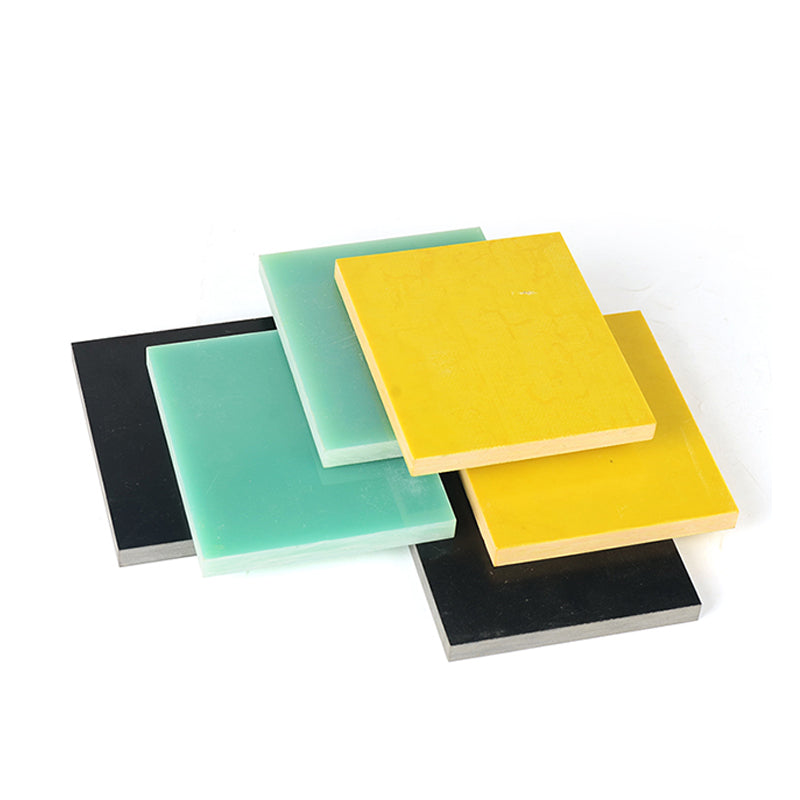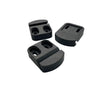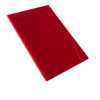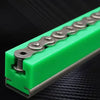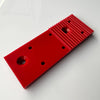Enhancing Aerospace Components with High-Strength Bakelite Sheets

In the demanding world of aerospace engineering, material selection is critical to ensuring performance, safety, and longevity. Bakelite, a pioneering synthetic plastic, has proven to be an indispensable material in this sector due to its unique properties. This blog post delves into the advantages of using Bakelite sheets in aerospace applications, focusing on their exceptional heat resistance and mechanical strength. You'll discover how Bakelite material provides unparalleled electrical insulation capabilities, making it a top choice for high-frequency electronics in aircraft systems. We also explore the customization options available for Bakelite board suppliers to meet specific aerospace needs and compare Bakelite to alternative materials. Real-world case studies highlight successful implementations, and we look ahead at future innovations in Bakelite properties that could further enhance its role in aerospace. Whether you're looking for Bakelite sheet for sale or simply interested in learning about Bakelite synthetics in high-performance environments, this comprehensive guide has you covered.

The Critical Importance of Thermal Stability in Aerospace Applications
In the aerospace sector, thermal stability is not just beneficial—it's essential. Aircraft components are routinely subjected to extreme temperatures, particularly in high-stress areas like engines and exhaust systems. To maintain safety and performance, these parts must be crafted from materials that can withstand such conditions without degradation. Bakelite, a robust synthetic plastic, has proven to be an ideal material in these demanding environments.
Bakelite's Heat Resistance: A Key Asset in Aerospace
One of the standout features of Bakelite material is its exceptional ability to resist heat, enduring temperatures up to 250°C without losing its structural integrity. This is due to the thermosetting phenol-formaldehyde resin that forms the basis of Bakelite. When heated, this resin undergoes a curing process that creates a dense, cross-linked polymer network. This network is what gives Bakelite its impressive heat resistance, making it indispensable in aerospace applications where high temperatures are a constant challenge.
Applications in High-Temperature Aerospace Components
Bakelite sheets are widely used in various aerospace components that are exposed to extreme heat. For instance, Bakelite is a common material in the construction of engine parts and thermal insulation components. These parts must maintain their shape and functionality despite prolonged exposure to high temperatures, and Bakelite's properties ensure they can do just that.
Bakelite in Engine Parts
In aerospace engines, where temperatures can soar, Bakelite plastic is often chosen for critical components due to its stability and durability under heat stress. This material's ability to maintain its mechanical properties even in extreme conditions makes it an essential part of the engine's construction, helping to ensure the safe and efficient operation of the aircraft.
The Role of Bakelite in Thermal Insulation
Beyond mechanical components, Bakelite also excels as a thermal insulator. Its low thermal conductivity and high resistance to heat make it an excellent material for insulating various parts of an aircraft, preventing heat transfer to sensitive areas and maintaining overall system integrity.
Electrical Insulation Properties of Bakelite in Aerospace
Another significant advantage of Bakelite is its electrical insulation capabilities, which are crucial in the aerospace industry. In addition to withstanding high temperatures, Bakelite effectively prevents electrical conductivity, making it ideal for components like connectors, housings, and other electronic systems within aircraft. By providing both thermal and electrical insulation, Bakelite ensures the reliability and safety of the aircraft's electronic systems.
Incorporating Bakelite into aerospace components not only enhances the thermal stability and durability of the aircraft but also contributes to the overall safety and efficiency of its operations. Learn more about Bakelite sheets for aerospace applications to understand how this material can meet your specific needs.
The Superior Mechanical Strength of Bakelite in Aerospace Applications
The aerospace industry demands materials that can endure intense physical stress without sacrificing performance. Bakelite, a pioneering synthetic plastic, is highly regarded for its exceptional mechanical strength, making it a crucial material in the construction of various aerospace components.
Understanding Bakelite's Mechanical Strength
Bakelite material is composed of a thermosetting phenol-formaldehyde resin, which forms a highly cross-linked polymer structure. This dense network of bonds gives Bakelite its notable rigidity and durability. Unlike thermoplastics that may soften and lose their shape under stress, Bakelite plastic retains its form and strength even when subjected to continuous mechanical loads. This property is especially important in the aerospace industry, where components must withstand the rigors of flight, including extreme pressure, vibration, and mechanical stress.

Applications of Bakelite in High-Stress Aerospace Environments
The mechanical strength of Bakelite makes it ideal for use in components that are exposed to constant stress in aerospace environments. For instance, Bakelite sheets are commonly used in the fabrication of structural elements such as bearings, gears, and insulation plates within aircraft. These parts need to endure the dynamic forces generated during takeoff, flight, and landing without deforming or breaking, and Bakelite provides the necessary durability to meet these demands.
Bakelite in Aircraft Bearings and Gears
Aircraft bearings and gears made from Bakelite benefit from its high tensile strength and resistance to wear. These components are crucial for the smooth operation of various systems within the aircraft, including engines and control surfaces. The ability of Bakelite plastic to maintain its mechanical properties under high stress ensures that these parts function reliably over time, reducing the need for frequent maintenance or replacement.
The Role of Bakelite in Aerospace Insulation Plates
In addition to its use in mechanical parts, Bakelite's mechanical strength also plays a significant role in its application as insulation plates. These plates must not only insulate but also support other components, often under high pressure. Bakelite sheets are designed to bear such loads without compromising their insulating properties, ensuring both structural integrity and safety in high-stress environments.
Enhancing Aircraft Durability with Bakelite
The use of Bakelite in aerospace components contributes to the overall durability and longevity of aircraft. The material’s ability to withstand physical stress without degradation ensures that critical parts continue to perform effectively throughout the lifespan of the aircraft. This reliability is particularly important in an industry where material failure can lead to catastrophic consequences.
By integrating Bakelite into the design and construction of aerospace components, manufacturers can achieve a balance of strength, durability, and performance, making it an essential material in the advancement of modern aerospace technology. Explore the mechanical properties of Bakelite to understand how it can enhance the durability and safety of your aerospace projects.
Bakelite’s Electrical Insulation Properties for Aircraft Systems
The aerospace industry demands materials that ensure the utmost safety and reliability, especially when it comes to electrical systems. Bakelite, known for its outstanding electrical insulation properties, plays a crucial role in protecting sensitive electronic components within aircraft. Its high dielectric strength makes it an excellent choice for various insulation applications, particularly in high-frequency electronic systems where maintaining signal integrity and preventing electrical failures are paramount.

The Importance of Dielectric Strength in Aircraft Systems
Dielectric strength refers to a material's ability to withstand electric stress without breaking down. In the context of aerospace, where electrical components are exposed to high voltages and frequencies, a material’s dielectric strength is critical. Bakelite material excels in this regard, offering a robust barrier against electrical currents. This property is essential for the safe operation of aircraft systems, where even minor electrical failures can lead to significant risks.
Bakelite’s Role in High-Frequency Electronic Systems
Aircraft are equipped with sophisticated electronic systems that operate at high frequencies. These systems require materials that not only insulate but also prevent signal interference and degradation. Bakelite plastic, with its low dielectric loss and high resistance to electrical conductivity, ensures that signals within the aircraft's electronic systems remain clear and uninterrupted. This is particularly important in radar systems, communication devices, and navigation instruments, where precision and reliability are non-negotiable.
Applications of Bakelite in Aircraft Electrical Insulation
Bakelite sheets are commonly used to insulate electrical components such as transformers, connectors, and circuit boards within aircraft. These components must operate efficiently under high-stress conditions, and Bakelite's properties provide the necessary protection. For instance, Bakelite is often used in the insulation of high-voltage circuits, where it prevents short circuits and ensures the safe flow of electricity throughout the aircraft.
Insulation in Transformers and Connectors
In aircraft transformers, Bakelite acts as a reliable insulating material, preventing electrical leakage and ensuring that the transformers operate efficiently at high voltages. Similarly, Bakelite insulation in connectors ensures that the connections between different electronic systems are secure and free from electrical faults. This is vital in maintaining the overall integrity of the aircraft's electrical network.
Ensuring Reliability in Circuit Boards
Circuit boards in aircraft are another critical area where Bakelite is extensively used. The material’s ability to provide both electrical insulation and structural support makes it ideal for this application. By preventing electrical interference and ensuring stable connections between components, Bakelite helps maintain the reliability of the aircraft’s electronic systems, even under extreme conditions.
Enhancing Safety with Bakelite Insulation
The safety of an aircraft is heavily dependent on the reliability of its electrical systems. Bakelite's high dielectric strength and excellent insulating properties significantly reduce the risk of electrical failures, such as short circuits or insulation breakdowns. By incorporating Bakelite into the design of aircraft electrical systems, manufacturers can ensure that these systems not only perform efficiently but also contribute to the overall safety of the aircraft.
Explore more about Bakelite's applications in electrical insulation to understand how this material can enhance the safety and reliability of your aerospace projects.

Customizing Bakelite Sheets for Specific Aerospace Needs
The diverse requirements of the aerospace industry necessitate materials that can be tailored to meet specific demands. Bakelite sheets, known for their superior thermal stability and mechanical strength, are highly versatile and can be customized in various ways to suit different aerospace applications. This flexibility ensures that Bakelite material remains an integral component in the manufacturing of aerospace parts, providing both durability and reliability.
Customization in Thickness: Meeting Specific Load and Stress Requirements
One of the most important customization options for Bakelite sheets is thickness. The thickness of a Bakelite sheet can significantly impact its performance, particularly in applications where mechanical strength and load-bearing capacity are critical. For instance, thicker Bakelite sheets are ideal for components that must withstand high mechanical stress, such as structural supports or insulation plates within aircraft. These thicker sheets provide enhanced durability, ensuring that the components can endure the intense physical demands of aerospace environments.
Conversely, thinner Bakelite sheets may be used in applications where flexibility and weight reduction are prioritized, such as in electronic components or insulation for less stressed parts of the aircraft. The ability to choose from a wide range of thicknesses allows manufacturers to optimize the material for specific applications, ensuring both performance and efficiency.
Customization in Size: Adapting to Complex Geometries and Space Constraints
The size of Bakelite sheets can also be customized to fit the exact specifications required by aerospace engineers. In the aerospace industry, space is often at a premium, and components must be designed to fit precisely within the available space without compromising functionality. Bakelite sheets can be produced in various sizes, from large panels used in insulation to smaller, precision-cut pieces for specific parts like electrical connectors or circuit boards.
This flexibility in size customization is particularly beneficial in the design of aerospace components that must conform to complex geometries. Whether for large surface areas or intricately shaped components, Bakelite can be fabricated to meet the exact dimensions required, ensuring a perfect fit within the aircraft's design parameters.
Surface Treatments and Coatings: Enhancing Performance for Specific Applications
Beyond thickness and size, Bakelite sheets can also be customized with surface treatments or coatings to enhance their performance in specific aerospace applications. For example, Bakelite can be coated with additional insulating layers to improve its electrical insulation properties, making it even more effective for use in high-voltage electrical systems. Alternatively, surface treatments can be applied to increase the material's resistance to environmental factors such as moisture, UV radiation, or chemical exposure, further extending the lifespan and reliability of Bakelite components in harsh aerospace environments.
Precision Machining and Custom Shapes: Tailoring Bakelite for Complex Aerospace Parts
Another significant customization option is the ability to machine Bakelite into precise shapes and configurations. Aerospace components often require complex designs that must meet stringent tolerances. Bakelite plastic can be precisely machined using advanced techniques such as CNC milling or laser cutting, allowing for the creation of custom parts that match the exact specifications of the aerospace application. This capability is essential for producing components like gears, bearings, or electrical insulators, where precision is critical to ensuring the overall performance and safety of the aircraft.

Collaborative Customization: Working with Suppliers for Optimal Solutions
To achieve the best results, aerospace manufacturers often collaborate closely with Bakelite board suppliers. These partnerships allow for the development of custom solutions that address specific challenges in aerospace design and engineering. By working with suppliers, manufacturers can access a broader range of customization options and receive expert guidance on the best ways to tailor Bakelite material to their needs.
Explore the various customization options for Bakelite sheets to find out how this versatile material can be adapted to meet your specific aerospace requirements, ensuring both performance and safety in critical applications.
Comparing Bakelite to Alternative Materials in Aerospace Engineering
In aerospace engineering, selecting the right material for components is crucial, as it impacts the overall performance, safety, and cost of the aircraft. Bakelite, a pioneering synthetic plastic, is often compared to other materials like polyimides and metals due to its unique properties. This section explores how Bakelite stacks up against these alternatives, focusing on key factors such as heat resistance, weight, and cost-effectiveness.
Heat Resistance: Bakelite vs. Polyimides and Metals
Bakelite is renowned for its excellent heat resistance, making it a reliable choice for aerospace components exposed to high temperatures. It can withstand temperatures up to 250°C without losing its structural integrity, making it comparable to high-performance polyimides. Polyimides, known for their ability to resist extreme temperatures, often exceed Bakelite in heat resistance, capable of enduring even higher temperatures, sometimes above 300°C. However, polyimides are significantly more expensive, which can be a limiting factor in their widespread use.
When compared to metals such as aluminum and steel, Bakelite offers a distinct advantage in thermal insulation. Metals, while capable of withstanding high temperatures, tend to conduct heat, which can be a disadvantage in applications where thermal insulation is required. Bakelite, on the other hand, provides both heat resistance and insulation, making it an ideal material for components that need to remain cool under thermal stress.
Weight Considerations: Bakelite’s Lightweight Advantage
Weight reduction is a critical factor in aerospace engineering, as it directly impacts the efficiency and fuel consumption of aircraft. Bakelite is significantly lighter than most metals, providing a clear advantage in applications where reducing weight is essential. For example, aluminum, while lighter than steel, is still considerably heavier than Bakelite plastic. The use of Bakelite in non-structural components can lead to substantial weight savings, contributing to improved fuel efficiency and overall performance.
In comparison to polyimides, Bakelite is similarly lightweight, but its cost advantage makes it a more attractive option for certain applications. Polyimides may be chosen for specific high-performance components where their superior heat resistance is necessary, but Bakelite offers a more balanced solution when both weight and cost are considered.
Cost-Effectiveness: Bakelite’s Economic Benefits
Cost-effectiveness is a major consideration in aerospace material selection, and Bakelite excels in this area. Bakelite material is generally more affordable than polyimides and many metals, making it a cost-efficient choice for large-scale production. The affordability of Bakelite does not come at the expense of performance; it still provides excellent mechanical strength, heat resistance, and electrical insulation properties, making it suitable for a wide range of aerospace applications.
Polyimides, while offering superior performance in some areas, are considerably more expensive, which limits their use to specific, high-demand applications where their properties are absolutely necessary. Metals, depending on the type and application, can also be more expensive to process and integrate into designs, especially when additional insulation or weight reduction measures are required.
Practical Applications: Where Bakelite Shines
In practical aerospace applications, Bakelite is often chosen for components like insulation plates, bearings, and electrical connectors, where its combination of heat resistance, lightweight nature, and cost-effectiveness provide a balanced solution. For structural components or those exposed to extreme heat beyond Bakelite's capacity, polyimides or metals may be preferred despite their higher costs.
By understanding the strengths and limitations of Bakelite compared to polyimides and metals, aerospace engineers can make informed decisions that optimize both performance and cost, ensuring the safety and efficiency of their designs. Explore more about Bakelite's benefits in aerospace engineering to determine how it can be effectively integrated into your projects.

Case Studies: Successful Aerospace Applications of Bakelite Sheets
The versatility and reliability of Bakelite sheets have made them indispensable in various aerospace applications. This section presents real-world examples of how Bakelite has been effectively utilized in the aerospace industry, highlighting its role in enhancing the safety, efficiency, and performance of aircraft components.
Electrical Insulation in High-Voltage Systems
One notable application of Bakelite sheets is in the insulation of high-voltage electrical systems within aircraft. In a recent project involving the modernization of avionics in a fleet of commercial airliners, Bakelite was selected for its superior dielectric strength and ability to prevent electrical leakage. Engineers used Bakelite sheets to insulate high-voltage connections and transformers, ensuring that the electrical systems remained stable and free from interference. The material's excellent electrical insulation properties were crucial in maintaining the reliability of these systems, particularly during takeoff and landing, where electrical demands are highest.
Thermal Insulation in Engine Components
In another case, Bakelite plastic was used as a thermal insulator in the development of advanced aircraft engines. The project required materials that could withstand extreme temperatures without degrading or losing their insulating properties. Bakelite sheets were employed to insulate components within the engine's high-temperature zones, including areas around the combustion chamber. The heat resistance of Bakelite ensured that these components remained protected from thermal damage, contributing to the engine's overall efficiency and longevity.
Structural Support in Aerospace Bearings
Bakelite's mechanical strength was leveraged in a project involving the design of aerospace bearings. These bearings, integral to the operation of various aircraft control systems, needed to withstand continuous mechanical stress without compromising performance. Bakelite sheets were used to construct the bearings, providing the necessary structural support while also reducing the overall weight of the components. The use of Bakelite resulted in bearings that were not only durable but also lightweight, enhancing the aircraft's performance and fuel efficiency.
Lightweight Components for Aircraft Interiors
The lightweight nature of Bakelite was a key factor in its selection for various aircraft interior components. In a recent interior redesign project for a major airline, Bakelite sheets were used to create lightweight yet durable seat trays, armrests, and overhead bins. These components needed to meet strict weight requirements to optimize the aircraft's fuel efficiency while also being strong enough to withstand regular use by passengers. The use of Bakelite allowed the design team to achieve both goals, resulting in a more efficient and comfortable cabin environment.
Enhancing Safety with Flame-Resistant Panels
Safety is always a top priority in aerospace engineering, and Bakelite's flame-resistant properties have been effectively utilized in the creation of fire-resistant panels for aircraft. In a project focused on improving the safety of commercial jets, Bakelite sheets were chosen to construct panels for the aircraft's electrical compartments. These panels not only provided excellent electrical insulation but also served as a crucial barrier against potential fires. The flame-resistant nature of Bakelite helped prevent the spread of fire within the aircraft, significantly enhancing onboard safety.
High-Performance Applications in Military Aircraft
Bakelite has also been successfully used in military aircraft, where performance and reliability are critical. In a defense project aimed at upgrading the avionics of fighter jets, Bakelite sheets were used to insulate and protect sensitive electronic components. The material's heat resistance, mechanical strength, and electrical insulation capabilities made it an ideal choice for this high-stakes environment, where even minor failures could have severe consequences. The use of Bakelite contributed to the improved performance and reliability of the aircraft's systems, ensuring mission success.
Discover more about Bakelite's applications in aerospace by exploring how this versatile material can meet your specific project requirements, ensuring safety, performance, and cost-efficiency.

Future Trends: Innovations in Bakelite for the Aerospace Industry
The aerospace industry is continuously evolving, and so are the materials that support it. Bakelite, long valued for its mechanical strength and thermal stability, is undergoing significant advancements that promise to enhance its applications in this high-demand sector. Ongoing research and development are focused on improving Bakelite’s properties to meet the increasingly stringent requirements of modern aerospace engineering.
Advancements in Thermal Properties
One of the most exciting areas of innovation in Bakelite material science is the enhancement of its thermal properties. Researchers are working on new formulations that could push Bakelite's heat resistance beyond its current threshold of 150°C. These innovations involve the integration of advanced additives and fillers that enhance thermal stability without compromising the material's other properties. This could make Bakelite even more suitable for extreme aerospace environments, such as in high-temperature engine components and thermal shields, where maintaining material integrity under intense heat is critical.
Enhanced Mechanical Strength and Durability
Another key focus of ongoing research is improving the mechanical strength and durability of Bakelite plastic. Advances in polymer chemistry are enabling the development of Bakelite composites that offer superior tensile strength and resistance to wear and tear. These composites incorporate high-strength fibers or nanomaterials that reinforce the Bakelite matrix, resulting in a material that can withstand even greater mechanical stresses. Such innovations are particularly valuable for aerospace applications where components are subjected to continuous mechanical loads and need to maintain their performance over extended periods.
Lightweight Bakelite Composites for Aerospace
Weight reduction is a perpetual goal in aerospace engineering, and recent developments in Bakelite composites are making strides in this area. By incorporating lightweight fillers such as carbon nanotubes or hollow microspheres, researchers are creating Bakelite sheets that maintain the material's inherent strength while significantly reducing its weight. These lightweight Bakelite composites could be game-changers for aerospace applications, particularly in non-structural components where reducing weight without compromising functionality can lead to significant gains in fuel efficiency and overall aircraft performance.
Improved Electrical Insulation Capabilities
Bakelite's electrical insulation properties have always been one of its strongest attributes, especially in high-frequency aerospace electronics. Recent research is focused on further enhancing these capabilities by developing Bakelite formulations with even higher dielectric strength and lower dielectric loss. Innovations in this area are exploring the use of novel polymers and hybrid materials that can be integrated into the Bakelite matrix, providing superior electrical insulation while maintaining the material's thermal and mechanical properties. These advancements could lead to Bakelite sheets that are even more effective in protecting sensitive electronic components from electrical interference and ensuring reliable operation in demanding aerospace environments.
Eco-Friendly and Sustainable Bakelite Formulations
Sustainability is becoming increasingly important in the aerospace industry, and researchers are responding by developing more eco-friendly Bakelite formulations. These innovations involve the use of bio-based resins and recycled materials in the production of Bakelite, reducing the environmental impact of its manufacture. Additionally, new processes are being explored to make Bakelite more recyclable at the end of its life cycle, aligning with the industry's push towards more sustainable practices. These eco-friendly Bakelite options could soon play a significant role in aerospace manufacturing, helping companies meet their sustainability goals without sacrificing performance.
Customizable Bakelite for Niche Aerospace Applications
Another emerging trend is the development of customizable Bakelite materials tailored for specific aerospace applications. Advances in material science are enabling the fine-tuning of Bakelite's properties to meet the unique requirements of different aerospace components. Whether it's adjusting the thermal expansion coefficient for precision parts or enhancing the flame resistance for safety-critical applications, these customizable Bakelite formulations provide aerospace engineers with more flexibility and control over the materials they use.
Explore more about the future of Bakelite in aerospace and discover how these cutting-edge innovations could benefit your next project by ensuring superior performance, reliability, and sustainability in the most challenging environments.

Common Questions and Answers about Bakelite and BeePlastics Customization
1. What customization options does BeePlastics offer for Bakelite sheets?
Answer: BeePlastics can undertake any customization for Bakelite sheets, including sample customization and batch production. Whether you need a small prototype or a large-scale batch, BeePlastics can tailor the Bakelite material to your specific requirements, ensuring that the final product meets your exact specifications.
2. What file formats does BeePlastics accept for custom Bakelite projects?
Answer: BeePlastics accepts a variety of file formats for custom projects, including PDF and CAD files. This flexibility allows you to submit your designs in the format that works best for you, ensuring seamless communication and accurate production.
3. Is there a minimum order quantity (MOQ) for custom Bakelite sheets at BeePlastics?
Answer: There is no minimum order quantity (MOQ) for custom Bakelite sheets at BeePlastics. Whether you need a single piece or a large batch, BeePlastics can accommodate your order, making it easy to get exactly what you need without unnecessary restrictions.
4. How does BeePlastics handle the production cycle for custom Bakelite orders?
Answer: The production cycle for custom Bakelite orders at BeePlastics is carried out according to the quantity and complexity of the order. BeePlastics will also communicate the production progress in real-time, ensuring you are kept informed every step of the way, from initial design to final delivery.
5. Can BeePlastics provide samples of custom Bakelite products?
Answer: Yes, BeePlastics supports the provision of samples for custom Bakelite products. The samples are provided free of charge, with the customer only responsible for the shipping costs. This allows you to evaluate the quality and suitability of the material before committing to a larger order.
6. What are the typical applications of customized Bakelite sheets provided by BeePlastics?
Answer: Customized Bakelite sheets from BeePlastics are commonly used in aerospace components, electrical insulation, automotive parts, and industrial machinery. The material’s thermal stability, mechanical strength, and electrical insulation properties make it ideal for demanding applications across various industries.
7. How does BeePlastics ensure the quality of custom Bakelite products?
Answer: BeePlastics ensures the quality of custom Bakelite products through strict quality control measures at every stage of production. From selecting the best raw materials to precision machining and final inspection, BeePlastics maintains high standards to deliver products that meet your specifications and industry standards.
8. Can BeePlastics customize the thickness and size of Bakelite sheets?
Answer: Yes, BeePlastics can customize both the thickness and size of Bakelite sheets to meet specific requirements. Whether you need a thin, flexible sheet or a thick, robust panel, BeePlastics can adjust the dimensions to suit your application needs.
9. How long does it take to complete a custom Bakelite order at BeePlastics?
Answer: The time required to complete a custom Bakelite order at BeePlastics depends on the complexity and quantity of the order. BeePlastics prioritizes timely production and keeps you informed of the progress, ensuring that you receive your custom products as quickly as possible without compromising on quality.
10. What are the benefits of choosing BeePlastics for custom Bakelite projects?
Answer: Choosing BeePlastics for your custom Bakelite projects offers several benefits, including flexible customization options, no MOQ, acceptance of multiple file formats, real-time communication during production, and the provision of free samples. These advantages make BeePlastics a reliable partner for delivering high-quality, customized Bakelite solutions tailored to your specific needs.
These questions and answers should provide comprehensive insights into the customization services offered by BeePlastics, making it easier for you to decide on your Bakelite project needs.
As the aerospace industry continues to evolve, the role of Bakelite as a reliable, versatile material becomes increasingly important. Its unique combination of thermal stability, mechanical strength, and electrical insulation properties ensures that it remains an indispensable choice for a wide range of aerospace applications. From insulating high-voltage systems to providing structural support in critical components, Bakelite has proven its worth in real-world scenarios. Moreover, ongoing innovations in Bakelite material science promise to enhance its capabilities even further, making it an even more valuable asset in the future of aerospace engineering. By choosing Bakelite, you're investing in a material that not only meets the stringent demands of today's aerospace industry but also positions your projects for success in the years to come.

Ready to start your next project with premium Bakelite plastic? Contact us today by filling out the form below or visit our dedicated Bakelite collection here.
-
Posted in
aerospace components, aerospace industry, aerospace safety, Bakelite benefits, Bakelite sheets, durability, engineering, flame retardancy, high-strength materials, material science, performance

